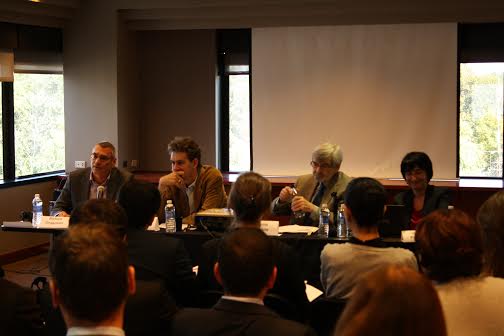
Breaking the Impasse in the Nagorno Karabakh Peace Process
A series of analytical meetings of conflict resolution experts from the region of the Nagorno Karabakh conflict, which seeks to facilitate the coordination of Track 1 and Track 2 efforts in resolving the Nagorno Karabakh conflict.
The Imagine Center for Conflict Transformation works in partnership with the Center for Peacemaking Practice of the School for Conflict Analysis and Resolution of George Mason University in implementing this project.
The aim of the project is to contribute to improved effectiveness of the Nagorno-Karabakh peace process through increased informal coordination between Track 1 and Track 2 levels, including between governmental representatives acting in their personal capacity, representatives of governmental think-tanks, conflict resolution experts, and representatives of the international community; development of a strategic approach to confidence-building that will complement and strengthen the official process.
The first meeting of Breaking the Impasse series took place in 2008 at Columbia University. Three Azerbaijani and three Armenian analysts jointly organized a panel discussion on the resolution of the Nagorno Karabakh conflict. Later, these six papers were published in a special issue of the International Negotiation journal on Nagorn0-Karabakh. The issue can be found on-line at http://www.ingentaconnect.com/content/mnp/iner/2010/00000015/00000001.
The second meeting of the series took place in September of 2009 at the Fletcher School of Law and Diplomacy and had two components. One was an open door symposium on the Nagorno-Karabakh conflict called “Re-assessing the Nagorno-Karabakh conflict in the aftermath of Russia-Georgia War” with the participation of eight Armenian and eight Azerbaijani diplomats, academics, and analysts. The second was a closed door meeting for the participants of the symposium using problem solving workshop methodology. During the closed door meeting, the topics for the next round of discussions were outlined. A periodical on-line publication focused on the analysis and resolution of the Nagorno-Karabakh conflict called Caucasus Edition (www.caucasusedition.net) has been launched as a result of this workshop.
The third meeting took place in Washington DC in Ocotber 2011 and was co-hosted by the School of Conflict Analysis and Resolution, George Mason University, the Carnegie Endowment for International Peace, and the Imagine Center for Conflict Transformation. The meeting was titled “Assessing the Deadlock in the Nagorno-Karabakh Peace Process.” Representatives of the Armenian and Azerbaijani foreign ministries, OSCE, US and UK governments, as well as a number of Armenian and Azerbaijani conflict resolution experts and civil society representatives participated in the meeting.
Initially, Breaking the Impasse was conceived as series of yearly conferences on the topic of the Nagorno-Karabakh conflict. Later, taking into account the deadlock in the negotiation process and rising tensions, we discussed a possibility of taking a more pro-active role in the peace process.
Currently, the process represents regular meetings of experts from the region of the Nagorno-Karabakh conflict working together toward development of recommendations for the local governments and international community toward the improvement the effectiveness of the peace process.



